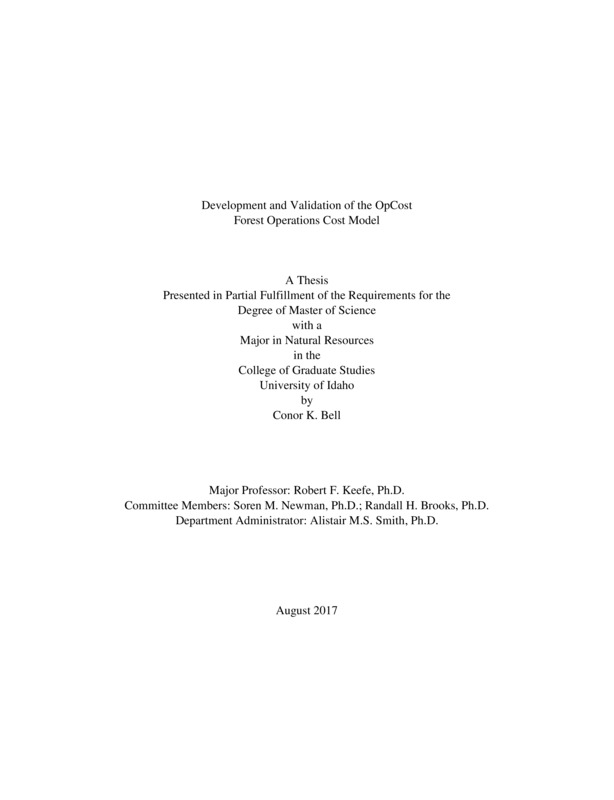Development and Validation of the OpCost Forest Operations Cost Model
Bell, Conor Kevin. (2017-06). Development and Validation of the OpCost Forest Operations Cost Model. Theses and Dissertations Collection, University of Idaho Library Digital Collections. https://www.lib.uidaho.edu/digital/etd/items/bell_idaho_0089n_11207.html
- Title:
- Development and Validation of the OpCost Forest Operations Cost Model
- Author:
- Bell, Conor Kevin
- Date:
- 2017-06
- Program:
- Natural Resources
- Subject Category:
- Forestry
- Abstract:
-
OpCost is an open-source forest operations cost simulator written in the R statistical programming language. OpCost is an updated version of an earlier model, the Fuel Reduction Cost Simulator (FRCS), with increased functionality. OpCost also has faster processing speed when used within the landscape-scale analytical framework, Bioregional Inventory Originated Under Management (BioSum). In this thesis, after providing a brief background on cost modeling in operational forestry, I describe the development and structure of OpCost in Chapter 2, which is subsequently being published as a General Technical Report by the USDA Forest Service Pacific Northwest Research Station. In Chapter 3, I describe a study conducted to validate OpCost predictions using an independent data set, something which has not been common in the fields of forest operations or forest engineering. In order to validate model predictions, I used a mixed method survey approach to sample professional logging contractor estimates of logging costs at each of three regional logging conferences in Idaho, Washington and Oregon in 2016. Stand and site conditions for timber sales with a range of pre-treatment conditions were generated using the Forest Vegetation Simulator model coupled with GIS. This approach made it possible to obtain both OpCost-generated predictions of fuel reduction treatment costs, and contractor estimated costs for areas with identical conditions. OpCost predictions for total, system-wide treatment cost, were not different from contractor estimates when compared using equivalence testing. However, the production rates of individual pieces of equipment estimated by contractors differed from those predicted by OpCost. Our approach to model validation using contractor surveys was novel and useful because it facilitated standardized conditions provided as input to both the contractors and the model. Fuel treatment cost estimation is critical for determining the cost effectiveness of management decisions at the wildland urban interface (WUI) and beyond. This work will help to advance landscape-scale analysis of the cost-effectiveness of fuel treatments, guiding researchers and managers in better understanding the long-term implications of their management decisions.
- Description:
- masters, M.S., Natural Resources -- University of Idaho - College of Graduate Studies, 2017-06
- Major Professor:
- Keefe, Robert F.
- Defense Date:
- 2017-06
- Identifier:
- Bell_idaho_0089N_11207
- Type:
- Text
- Format Original:
- Format:
- application/pdf
- Rights:
- In Copyright - Educational Use Permitted. For more information, please contact University of Idaho Library Special Collections and Archives Department at libspec@uidaho.edu.
- Standardized Rights:
- http://rightsstatements.org/vocab/InC-EDU/1.0/

